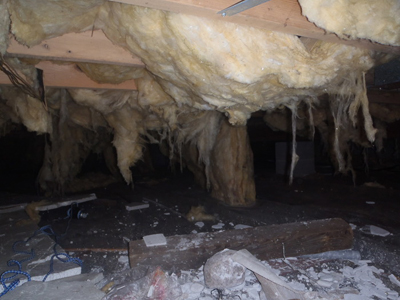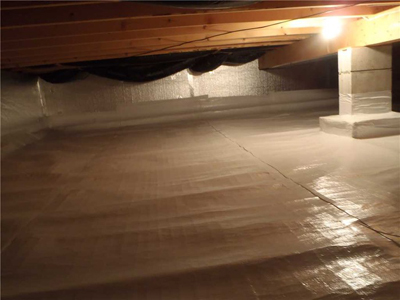Top 5 Ways Your Crawl Space Affects Your Home!
Crawl Spaces are very popular in Atlanta, Georgia and other southern states for several reasons.
First, they tend to be cheaper than laying a foundation for a basement slab.
Second, crawl spaces make it much easier to access pipes and other utilities.
Third, if the soil is unstable, it is simpler to install a crawl space by bringing the house up to or above ground level.
Finally, there are aesthetic reasons. A raised house makes it look bigger.
The purpose of this article is to explain how and why your crawl space could be contaminating your indoor air.
What’s In My Crawl Space?
If you have not visited your crawl space, take a look. Typically, you will find the following:
- Dirt. Most homeowners have a bare dirt or rock crawl space.
- Ductwork. Many of your home appliances run out through the crawl space area. Washers, dryers, and plumbing pipes are often found running along the ceiling of the crawl space, to be vented or piped to the outdoors or external holding tanks. Ductwork for the home heating and cooling systems are also usually found here.
- Plumbing Pipes. Home plumbing is usually found in your crawl space, funneled outside to your septic tank or the sewer system. These pipes are usually heavy duty so most homeowners are unconcerned about their safety. However, these pipes still require maintenance and care. Changes in temperature during the warmest and coldest months as water flows through them can cause condensation. Condensation and the increase of moisture in the air leads to mold growth.
- Electrical Wiring. Along the ceiling and walls of the crawl space you will usually see electrical wiring. Keeping these safe from the gnawing teeth of crawl space vermin is important.
- Vents. You will also notice various vents along the bottom walls of your house. These vents allow for air movement and ventilation for your crawl space.
- Insulation. Insulation is important. If you see nothing but bare beams and dirt, this is a concern. Up to 40% of your air comes up from the crawl space. You can lose up to 45% of your home’s heating and cooling energy through non-insulated crawl spaces. In addition, non-insulated crawl spaces are will incur mold growth and attract insects, rodents, and other crawl space vermin.
- Vapor Barrier. Vapor barriers help maintain the health of your crawl space and your family. Crawl spaces protected from excess moisture are less likely to develop mold or allow vermin and insects into your home. Vapor barriers protect not only your crawl space, but your entire home.
- Beams. Beams, heavy wooden or metal support structures, keep your home structurally sound. These beams run vertically and horizontally through your crawl space structure.
- Drains/Pumps. You may also notice a drain in the floor of your crawl space. Usually this is a sump pump, a water pump designed to carry any excess water away from the house in the case of a flood. Drains allow excess water to drain away a safe distance from the house, usually 6 feet or more.
- Critters and Other Creepy Crawlers. It’s all too common that a homeowner pokes his head into his crawl space to discover a happy population of insects, mice, rats, squirrels, or even snakes! Getting these invaders out of your home can be challenging. To be safe, call a pest control company.
Four Clues That You Have Issues With Your Crawl Space!
While you are taking a look at your crawl space, give Mold B Gone a call if you find any of these problems:
- Standing Water or Water Damage: Water damage can weaken the foundations and walls of your home, and needs to be dealt with quickly.
- Mold. Mold can be hazardous. If you have large areas of mold spreading across your beams, in your insulation, or along the ground it needs to be removed. Left unchecked, mold can severely damage your home and your air quality.
- Ruined Insulation: No insulation lasts forever, though some types of insulation are more long lasting than others. When insulation is falling to pieces or has rodents nesting in it, it’s time to remove the old insulation and replace it.
- High Humidity: Knowing your crawl space humidity is essential to keeping it clean and safe. Vapor barriers are an important part of a crawl space because it prevents moisture and high humidity, something that creates a breeding ground for mold and pests. If you have a bare dirt floor, crawl space encapsulation is important.
Now that you understand what is in your crawl space and the top four signs that you may have issues with your crawl space, the remainder of this article will list the top 5 ways your crawl space affects your home.
#1 Poor Air Quality
Moisture accumulates in your crawl space because of high humidity, changing temperatures that leads to condensation, rainy weather, and the lack of preemptive solutions, like a vapor barrier. For this reason, it is important that the moisture content of your crawl space is monitored properly.
If the moisture content of your crawl space is not monitored, mold and rot will grow in the insulation or on the wooden beams. When the mold grows, it releases mycotoxins that can seep through the floorboards of your home, which in turn can cause sickness.
Even though the mold is growing under your home, you need to take action because 40% of the air in your home seeps up through the crawl space.
Simply put, if your crawl space has mold problems, then the indoor air quality of your home will be negatively affected.
#2 High Energy Bills
Properly insulating your crawl space will save on utility costs because the insulation prevents temperature transfers. This will ensure that your home stays cool when the air conditioner is running and warm if you need to heat your home during the colder months.
#3 Rodents and Insects
Despite the fact that your crawl space may be surrounded by a thick layer of concrete serving as the foundation, your crawl space may not be as predator-proof.
There are two key reasons that rodents and insects can affect your home.
First, droppings and feces left behind will affect the air quality inside your home.
Second, certain rodents, like squirrels will get curious and start chewing on any exposed electrical wires, ruin insulation, or rip holes in a vapor barrier.
#4 Damaged Subfloor
Moisture accumulation in your crawl space will not only affect the air quality of your home, it can also seep through the ceiling of the crawl space and damage your sub-floor. When this occurs, it will begin to warp and eventually need to repaired or replaced.
#5 Compromised Foundation
More than just the subfloor, however, moisture problems can also cause issues for the foundational level of your home. The wooden beams that hold up your home’s structure can be damaged by consistent exposure to high levels of moisture, condensation, or humidity. In some not-so-uncommon cases, crawl spaces have actually flooded, causing significant structural damage that resulted in thousands of dollars of repair work.
Got Crawl Space or Mold Questions?
Call 678-697-6267, or contact us via e-mail.
We look forward to serving you! 🙂
Crawl Space Contaminating Your Indoor Air Infographic Summary
#CrawlSpace Contaminating Your Indoor Air? https://t.co/MiEaVTOYHS PLEASE RETWEET #IAQ pic.twitter.com/iKOTwq4BD0
— Mold B Gone (@moldbgonega) May 27, 2016



